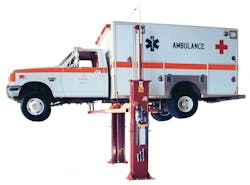What business are you missing?
Do you sell tools? Or do you sell all of the tools and equipment a shop needs? How you answer may make the difference between having a great year or an average year.
Some distributors believe they’re in the business of selling tools to garages and vehicle repair facilities. Others take a broader view to supply these repair shops with tools and all of the capital equipment (lifts, wheel balancers, A/C machines, etc.) a repair shop needs to be successful. Do you take a wide or narrow viewpoint of your customers' needs.
Mobile tool dealers have an advantage over capital-equipment-only distributors, as they are in every shop with more frequency to see all of the people on their route. This face time gives them the ability to build better relations with the shop manager, owner, foreman and all the techs in the garage. In asking questions beyond the norm of showing techs the newest/latest/greatest tools, mobile tool distributors can discover what the next capital equipment purchase might be:
- Do they need a lift in bay 4?
- Is the old ATF exchanger unreliable?
- Is the alignment machine or wheel balancer so outdated that it won’t service every vehicle that comes into the shop?
This is your opportunity to start talking to the techs and shop owner/foreman about the lifts you sell, the fluid exchange machine or a new aligner capable of handling all of the vehicles that roll into the garage. Here’s an example:
You’re visiting a shop and see a Ford F-550 utility truck or work truck on your customer's 10-year-old two-post above-ground lift. As a smart businessman in this industry, you know that an F-550 work truck weighs about 16,000 lbs., but you know that the lift is only rated at about 13,000 lbs. Is the customer overloading the lift? Absolutely. Is the customer in need of a lift upgrade? Absolutely.
The question you need to ask yourself is simply, "Who is going to make the sale of the new lift?" Will it be you? Or will it be the equipment-only reseller who only stops in this garage once a year? The math for your compensation is simple. Do you want to make 25 percent on a $100 wrench or 15 percent on a $10,000 lift? Are you stepping over dollar bills to pick up nickels and dimes?
As a supplier to all of the garages you call on, you need to ask yourself, "Am I a mobile tool salesman? Or am I a salesman that sells tools and capital equipment to all of the garages I visit?" To be successful in adding capital equipment sales, mobile tool distributors need to develop relationships with local equipment specialists or the right equipment factory that allows them to be competitive and make good commissions.
Creating a working relationship with a local dedicated equipment reseller is not feeding a competitor—they are not your competitor as they don’t sell repair tools. So, maybe you want to sell a lift, but the customer wants the lift installed. Are you in the business of installing lifts? Training the techs on a new aligner or brake lathe? Likely not. That's where the relationship with the equipment-only reseller comes in.
When looking to grow your business and income, one of the key considerations should be the profit potential of any given product line. Research whether 100 resellers in your area sell this product, or if the manufacturer limits resellers to assist in the profitability of it’s resellers. Ask questions such as;
- Am I compensated from the factory if a national account buyer places an order in my area?
- What support (sales training and reseller support) do the companies I am considering representing offer?
- Does the factory send you the sales leads from your area for follow-up? (Or do they “sandbag” these leads for the in-house sales staff?)
- Is the manufacturer a known company in the industry?
Starting a business relationship with any manufacturer or taking on a new product line you’re considering selling is like a marriage. Both sides need to work together and put forth the effort to be successful.
